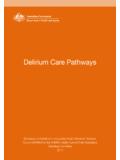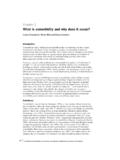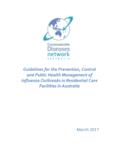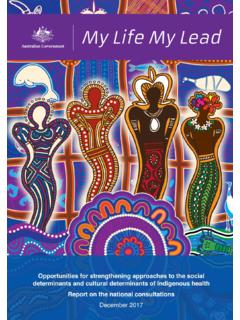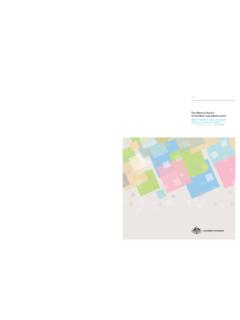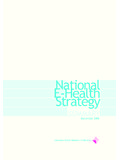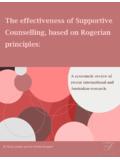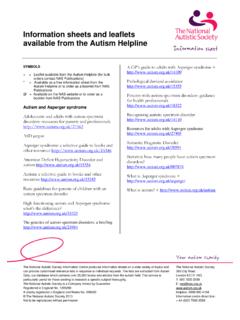Transcription of The Effectiveness of Family and Relationship Therapy
1 The Effectiveness of Family and Relationship Therapy : A Review of the Literature PACFA, July 2012 This publication is copyright. No part may be reproduced by any process except in accordance with the provisions of the Copyright Act 1968. Suggested citation: Evans, P., Turner, S. and Trotter, C. (2012), The Effectiveness of Family and Relationship Therapy : A Review of the Literature. Melbourne: PACFA. Acknowledgments: The review was generously funded by an anonymous philanthropic body. 1 Foreword This document is a literature review of research into the Effectiveness of Family Therapy , intended as a resource for counsellors and psychotherapists.
2 It was written on behalf of the PACFA Research Committee. However, this does not imply that PACFA or its Member Associations endorses any of the particular treatment approaches described. The PACFA Research Committee recognises that it is important to counsellors and psychotherapists that they have access to recent research evidence that demonstrates the Effectiveness of different therapeutic approaches, to assist them in their practice. This document is one of a series of reviews that has been commissioned by the PACFA Research Committee to support its Member Associations in their work. The PACFA Research Committee endorses the American Psychological Association s definition of evidence-based practice as the integration of the best available research evidence with clinical expertise in the context of patient characteristics, culture and preferences , although we would prefer to use the word client or consumer rather than patient'.
3 The PACFA Research Committee recognises that there is overwhelming research evidence to indicate that, in general, counselling and psychotherapy are effective and that, furthermore, different methods and approaches show broadly equivalent Effectiveness . The strength of evidence for Effectiveness of any specific counselling and psychotherapy intervention or approach is a function of the number, independence and quality of available Effectiveness studies, and the quality of these studies is a function of study design, measurements used and the ecological validity ( its approximation to real life conditions) of the research.
4 The PACFA Research Committee acknowledges that an absence of evidence for a particular counselling or psychotherapy intervention does not mean that it is ineffective or inappropriate. Rather, the scientific evidence showing equivalence of effect for different counselling and psychotherapy interventions justifies a starting point assumption of Effectiveness . It should be noted that this review is limited in its scope and covers only seven modalities within Family Therapy . It was beyond the scope of this literature review to determine which groups of clients have been shown to benefit from Family Therapy .
5 For more details about specific groups responding to Family Therapy , we recommend you visit the Cochrane Reviews at The PACFA Research Committee is committed to supporting our Member Associations and Registrants to develop research protocols that will help the profession to build the evidence-base to support the known Effectiveness of counselling and psychotherapy. We hope that you will find this document, and others in this series, useful. We would welcome your feedback. Dr Sally Hunter Chair of the PACFA Research Committee, 2012 2 Contents Outline of the Literature Review .. 3 Aims of this review.
6 3 Scope and methodology of this review .. 3 Defining effective practice .. 4 Examining the Modalities .. 5 1. Experiential Family Therapy .. 5 2. Structural Family Therapy .. 6 3. Cognitive Behaviour Therapy (CBT) .. 8 4. Multi-Systemic Therapy (MST) .. 10 5. Family Problem Solving .. 12 6. Solution Focused Brief Therapy (SFBT) .. 14 7. Narrative Therapy .. 15 Concluding Comments .. 16 References .. 18 Appendices .. 25 Appendix 1 Table of experiential Family Therapy studies .. 25 Appendix 2 Table of structural Family Therapy studies .. 26 Appendix 3 Table of cognitive-behavioural studies .. 27 Appendix 4 Table of Multi-Systemic Therapy studies.
7 29 Appendix 5 Table of Family problem-solving studies .. 33 Appendix 6 Table of Solution Focused Brief Therapy studies .. 34 Appendix 7 Table of narrative Therapy studies .. 35 3 Aims of this review This literature review examines the Effectiveness of Family and Relationship Therapy and psychotherapy in relation to the following seven of the key modalities. 1. Experiential Family Therapy (EFT) 2. Structural Family Therapy (SFT) 3. Cognitive Behavioural Therapy (CBT) 4. Multi-systemic Therapy (MST) 5. Family Problem Solving 6. Solution Focused Therapy (SFT) 7. Narrative Therapy It is acknowledged that these modalities represent only a sample of the many forms of Family Therapy practiced in Australia and elsewhere.
8 They do represent however some of the key approaches. This review poses the central research question: To what extent, if any, is Family and Relationship Therapy and psychotherapy effective? The review systematically poses this question when examining each of the seven key modalities. The review assumes that the common aim of each of these modalities as they relate to the field of Family and Relationship Therapy is to identify and treat problematic Family and intra-personal Relationship dynamics, as defined by the client(s). The review also identifies any knowledge gaps pertinent to the research area.
9 Scope and methodology of this review This review describes the characteristics of relevant Australian and international studies, their findings and conclusions, and compares and contrasts relevant studies and findings to determine their veracity. The primary focus, where possible, is on literature released in Australia during the past ten years and internationally in the past five years. Where there is a dearth of available robust research outcomes in this time period, the timeframe has been expanded. The inclusion criteria for this review provide preference to the following types of studies, in order: 1.
10 Randomised control trial studies. 4 2. Efficacy studies undertaken under controlled clinical conditions and Effectiveness studies elicited from everyday practice. 3. Process research that determines Effectiveness ( therapeutic alliance, therapist variables and Family members experience and expectation of Therapy ). The following exclusion criteria have been applied to studies in this review: 1. Purely descriptive studies. 2. Studies with poor methodology ( ill-defined terms, no outcome measures, etc.). 3. Studies that have not been published in peer reviewed journals. 4. Explorative studies. 5. Studies with sample sizes too small to generalise findings.
